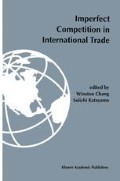Abstract
In the standard perfectly competitive model, an import (export) subsidy never constitutes an optimal trade policy for a large country. Yet, in their influential papers (1984a, 1984b) Brander and Spencer showed that an import subsidy could be the best policy to use in the presence of a foreign monopoly. This chapter shows that when production decisions are irreversible, and there is no precommitted trade policy, the conventional outcome of an optimal tariff reappears even in the presence of a foreign monopoly.1
Access this chapter
Tax calculation will be finalised at checkout
Purchases are for personal use only
Preview
Unable to display preview. Download preview PDF.
References
Brander, J. A. and B. J. Spencer (1984a), Trade warfare: tariffs and cartels, Journal of International Economics 16, 227–242.
Brander, J. A. and B. J. Spencer (1984b), Tariff protection and imperfect competition, in H. Kierzkowski (ed.), Monopolistic Competition and International Trade. Oxford: Oxford University Press.
Brander, J. A. and B. J. Spencer (1985), Export subsidies and international market share rivalry, Journal of International Economics 18, 83–100.
De Meza, D. (1989), Not even strategic trade theory justifies export subsidies, Oxford Economic Papers 41. Oxford: Oxford University Press, 720–736.
Dixit, A. K. and G. M. Grossman (1986), Targeted export promotion with several oligopolistic industries, Journal of International Economics 21, 233–249.
Eaton, J. and G. M. Grossman (1985), Tariffs as insurance: optimal commercial policy when domestic markets are incomplete, Canadian Journal of Economics 18, 258–272.
Eaton, J. and G. M. Grossman (1986), Optimal trade and industrial policy under oligopoly, Quarterly Journal of Economics 101, 383–406.
Jones, R. W. (1987), Trade taxes and subsidies with imperfect competition, Economics Letters 23, 375–379.
Lapan, H. E. (1988), The optimal tariff, production lags, and time consistency, American Economic Review 78, 395–401.
Staiger, R. W. and G. Tabellini (1987), Discretionary trade policy and excessive protection, American Economic Review 77, 823–837.
Editor information
Editors and Affiliations
Rights and permissions
Copyright information
© 1995 Springer Science+Business Media New York
About this chapter
Cite this chapter
Ishizawa, S. (1995). Tariff Protection, Imperfect Competition, and Time Consistency. In: Chang, W.W., Katayama, S. (eds) Imperfect competition in international trade. Springer, Boston, MA. https://doi.org/10.1007/978-1-4615-2249-2_9
Download citation
DOI: https://doi.org/10.1007/978-1-4615-2249-2_9
Publisher Name: Springer, Boston, MA
Print ISBN: 978-1-4613-5947-0
Online ISBN: 978-1-4615-2249-2
eBook Packages: Springer Book Archive

